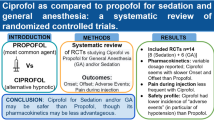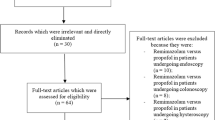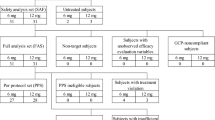Abstract
Purpose
This trial was conducted to confirm the non-inferiority of remimazolam versus propofol in the induction and maintenance of general anesthesia in surgical patients.
Methods
Surgical patients (n = 375) were randomized to remimazolam started at 6 or 12 mg/kg/h by continuous intravenous (IV) infusion until the loss of consciousness (LoC), followed by 1 mg/kg/h to be adjusted as appropriate until the end of surgery or IV propofol administered as a slow bolus of 2.0–2.5 mg/kg until LoC followed by 4–10 mg/kg/h until the end of surgery. Efficacy was measured via the combined primary endpoint of no intraoperative awakening/recall, no need for rescue sedatives, and no body movements. Adverse events and adverse drug reactions (ADRs) were monitored for safety.
Results
Efficacy rates were 100% in all treatment groups, and the non-inferiority of remimazolam was demonstrated [95% confidence interval (− 0.0487; 0.0250)]. The time to LoC was longer in the remimazolam 6 (p < 0.0001) and 12 mg/kg/h (p = 0.0149) groups versus propofol. The time to extubation was longer in both remimazolam groups versus the propofol group (p ≤ 0.0001). The incidence of ADRs was similar in the remimazolam groups (39.3% and 42.7%, respectively) compared with the propofol group (61.3%). Decreased blood pressure occurred in 20.0% and 24.0% of patients treated with 6 and 12 mg/kg/h remimazolam, respectively, compared with 49.3% of patients receiving propofol. Injection site pain was reported in 18.7% of propofol patients but not in those receiving remimazolam.
Conclusions
This trial demonstrated that remimazolam was well tolerated and non-inferior to propofol with regard to efficacy as a sedative hypnotics for general anesthesia.
Clinical trial registration
This trial is registered with the Japan Pharmaceutical Information Center - Clinical Trials Information (JapicCTI). JapicCTI number: 121973



Similar content being viewed by others
References
Chitilian HV, Eckenhoff RG. Anesthetic drug development: novel drugs and new approaches. Surg Neurol Int. 2013;4(Suppl1):S2–S10.
Scott RP, Saunders DA. Propofol: clinical strategies for preventing the pain of injection. Anaesthesia. 1988;43:492–4.
Sneyd JR, Rigby-Jones AE. New drugs and technologies, intravenous anaesthesia is on the move (again). Br J Anaesth. 2010;105:246–54.
Tuk B, van Oostenbruggen MF. Characterization of the pharmacodynamic interaction between parent drug and active metabolite in vivo: midazolam and alpha-OH-midazolam. J Pharmacol Exp Ther. 1999;289:1067–74.
Saari TI, Uusi-Oukari M. Enhancement of GABAergic activity: neuropharmacological effects of benzodiazepines and therapeutic use in anesthesiology. Pharmacol Rev. 2011;63:243–67.
Kilpatrick GJ, McIntyre MS, Cox RF, Stafford JA, Pacofsky GJ, Lovell GG, Wiard RP, Feldman PL, Collins H, Waszczak BL, Tilbrook GS. CNS 7056: a novel ultra-short-acting benzodiazepine. Anesthesiology. 2007;107:60–6.
Schnider T, Minto C. Context sensitive decrement times of remimazolam. Anesth Analg. 2013;117:285.
Upton RN, Somogyi AA. Pharmacokinetics and pharmacodynamics of the short-acting sedative CNS 7056 in sheep. Br J Anaesth. 2010;105:798–809.
Antonik LJ, Goldwater DR. A placebo- and midazolam-controlled phase I single ascending-dose study evaluating the safety, pharmacokinetics, and pharmacodynamics of remimazolam (CNS 7056): part I. Safety, efficacy, and basic pharmacokinetics. Anesth Analg. 2012;115:274–83.
Ihmsen H, Eisenried A. Population pharmacokinetics of remimazolam after continuous infusion in volunteers. Poster 01AP14–1. Euroanaesthesia 2018. Copenhagen, Denmark 2018.
Wiltshire HR, Kilpatrick GJ. A placebo- and midazolam-controlled phase I single ascending-dose study evaluating the safety, pharmacokinetics, and pharmacodynamics of remimazolam (CNS 7056): part II. Population pharmacokinetic and pharmacodynamic modeling and simulation. Anesth Analg. 2012;115:284–96.
Worthington MT, Antonik LJ, Goldwater DR, Lees JP, Wilhelm-Ogunbiyi K, Borkett KM, Mitchell MC. A phase Ib, dose-finding study of multiple doses of remimazolam (CNS 7056) in volunteers undergoing colonoscopy. Anesth Analg. 2013;117:1093–100.
Borkett KM, Riff DS, Schwartz HI, Winkle PJ, Pambianco DJ, Lees JP, Wilhelm-Ogunbiyi K. A Phase IIa, randomized, double-blind study of remimazolam (CNS 7056) versus midazolam for sedation in upper gastrointestinal endoscopy. Anesth Analg. 2015;120:771–80.
Pambianco DJ, Borkett KM, Riff DS, Winkle PJ, Schwartz HI, Melson TI, Wilhelm-Ogunbiyi K. A phase IIb study comparing the safety and efficacy of remimazolam and midazolam in patients undergoing colonoscopy. Gastrointest Endosc. 2016;83:984–92.
Rex DK, Bhandari R, Desta T, DeMicco MP, Schaeffer C, Etzkorn K, Barish CF, Pruitt R, Cash BD, Quirk D, Tiongco F, Sullivan S, Bernstein D. A phase III study evaluating the efficacy and safety of remimazolam (CNS 7056) compared with placebo and midazolam in patients undergoing colonoscopy. Gastrointest Endosc. 2018;88(427–437):e6.
Pastis NJ, Yarmus LB, Schippers F, Ostroff R, Chen A, Akulian J, Wahidi M, Shojaee S, Tanner NT, Callahan SP, Feldman G, Lorch DG Jr, Ndukwu I, Pritchett MA, Silvestri GA, PAION Investigators. Safety and efficacy of remimazolam compared with placebo and midazolam for moderate sedation during bronchoscopy. Chest. 2019;155:137–46.
Doi M. Remimazolam. J Jpn Soc Clin Anesthesia. 2014;34:860–6 (in Japanese, abstract in English).
Probst S, Grossmann E (2014) Phase II study on ultra-short acting remimazolam vs. propofol / sevoflurane in cardiac surgery. Poster presentation. ASA 2014. New Orleans, USA.
International Conference on Harmonisation. Guideline for Good Clinical Practice: E6(R1). International Conference on Harmonisation of Technical Requirements for Registration of Pharmaceuticals for Human Use ICH Harmonised Tripartite Guideline. Geneva, Switzerland: ICH; 1996:1–59.
World Medical Association. WMA declaration of helsinki—ethical principles for medical research involving human subjects. Fortaleza: WMA; 2013. p. 1–8.
American Society of Anesthesiologists. ASA Physical Status Classification System. 2014.
Johansen JW. Update on bispectral index monitoring. Best Pract Res Clin Anaesthesiol. 2006;20:81–99.
Brice DD, Hetherington RR. A simple study of awareness and dreaming during anaesthesia. Br J Anaesth. 1970;42:535–42.
Acknowledgements
The authors thank Shigehito Sato, who served as the Lead Investigator of this clinical trial of remimazolam at the Hamamatsu University Hospital in Japan. They thank Ichiro Hatono, who provided overall trial monitoring as Director Clinical Research 1st Division, CMIC Co. They thank Kazunori Murakami, who provided data management services at Clinical Information Department, EPS Corporation. They acknowledge Shuya Kiyama, from Jikei University Hospital for serving as Medical Officer and providing advice on the overall conduct of the study and handling of individual subjects for analyses before unblinding. They acknowledge Creative Clinical Research GmbH, Berlin for providing medical writing support in drafting and finalizing this manuscript. They thank Melissa Crawford, PhD, from Edanz Group for editing a draft of this manuscript. This trial was conducted at 49 trial sites in Japan.
Funding
This study is supported by Ono Pharmaceutical Co.
Author information
Authors and Affiliations
Corresponding author
Ethics declarations
Conflict of interests
M. Doi is a consultant of PAION UK and Mundipharma. All others authors have no interests to declare.
Additional information
Publisher's Note
Springer Nature remains neutral with regard to jurisdictional claims in published maps and institutional affiliations.
Electronic supplementary material
Below is the link to the electronic supplementary material.
About this article
Cite this article
Doi, M., Morita, K., Takeda, J. et al. Efficacy and safety of remimazolam versus propofol for general anesthesia: a multicenter, single-blind, randomized, parallel-group, phase IIb/III trial. J Anesth 34, 543–553 (2020). https://doi.org/10.1007/s00540-020-02788-6
Received:
Accepted:
Published:
Issue Date:
DOI: https://doi.org/10.1007/s00540-020-02788-6




